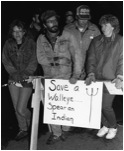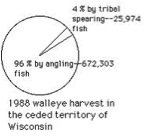The definition of tribal sovereignty changes from President to President as seen in these two examples from the previous and current administrations: President George W. Bush and President Barack Obama.
It’s obvious in President Bush’s response that this was possibly the first time he had thought about the meaning of tribal sovereignty, leaving us with a feeling of doubt in his ability to support tribal governments. President Obama does not give a direct definition either, but there is no doubt that his plans include helping tribes to retain and ultimately expand their autonomy.
If tribes are able to gain true sovereignty, they will be seen as independent nations and not as wards of the federal government. They will be able to try and convict any person, Native or non-Native, within the borders of their nation for any infraction of the law and they will not have to worry about the day when there are no more enrolled members, when there is no one left who has a high enough blood quantum to qualify for enrollment, leaving them without tribal status.
How can tribes expand their sovereignty to truly be seen as a separate nation and what will tribal sovereignty mean to the next administration? What does tribal sovereignty mean to tribes? How can tribes secure their sovereignty according to their own definition of it, rather than continuing to cede more and more of their autonomy? How can tribes reverse the losses they have already sustained?
This week, TLAM focused on ways in which laws from the three sovereigns of the U.S. affect the sovereignty of tribal nations (the third sovereign):
- Tribal government
- Federal government
- State government

We were very lucky to have Professor Larry Nesper speak with us about treaty rights, without which, tribal sovereignty might be more easily limited or possibly eliminated. Professor Nesper led us through a historical overview of several treaty cessions, most of which were contingent upon the whims of the federal government, including:
With his focus primarily on the Ojibwe spear fishing controversy of the late 1980s-early 1990s, (also the focus of his book The Walleye War The Struggle for Ojibwe Spearfishing and Treaty Rights), Professor Nesper brought to our attention the extreme importance of the existing historical, yet very valid, treaties in tribes having the ability to retain their cultural sovereignty, if not their complete political sovereignty.
The “Walleye War” of Professor Nesper’s book refers to the tense and sometimes violent relationship between the Ojibwe of Northern Wisconsin and the local non-Native population. During this period, the previously subtle face of racism was brought into full light.

As seen in the picture below, non-Native people who felt cheated by the rights of the Ojibwe showed their contention in a very visible way. Janice Rice shared her memories of non-Native and Native supporters of Ojibwe rights traveling to the boat landings of Lake Superior in order to “witness” the acts of racism, in effect holding the protestors responsible for their actions. This helped to alleviate much of the violence that was taking place.
Another deterrent for protestors was an injunction set in place by Judge Barbara Crabb, which according to Professor Nesper, made the acts against the Ojibwe cost the protestors more than $700, because these acts were violating federal law.

In our class discussion following Professor Nesper’s talk, we questioned what would cause people to protest with such vehemence? It seems so petty, especially in light of the fact that, according to Professor Nesper’s information, the Ojibwe fish a mere 2-4% of all of the walleye in that area.
Professor Nesper had also shared that when he, as an anthropologist, interviewed various protestors at the boat landings, inquiring as to whether they knew the scientific facts of the situation they did not. They said they were protesting because of their gut feeling. In essence, they felt like they were being refused rights that were being given to the Ojibwe. We were confused as to how people could act on a gut feeling, rather than attempting to learn the facts of the situation.
This example is just one in the history of tribal government (the third sovereign) relations with the federal government, state government, and non-Native people. It is one of the more positive examples, because the Ojibwe were able to continue practicing their ancestral heritage.
Allies were a significant actor in the positive outcome of this instance. Tribal sovereignty is aided by the support and collaboration of tribes with allies outside the tribe.
Libraries, archives, and museums have a responsibility to be allies of tribes, in order to support tribes in their quest for true sovereignty. Support can come in many forms, including assisting tribes in:
- preserving culture in tangible forms, such as documents and artwork.
- collecting and preserving recorded history, in the form of interviews, meetings, etc.
- providing a meeting place for cultural events and language classes.
- coordinating events to promote mutual understanding between tribes and local non-Natives.
- promoting Act 31 by collecting for and providing culturally relevant curricula to schools.
There are many more avenues of support which libraries, archives, and museums can lend to tribes. Please share any ideas you have.
Sources and other places for information on the Ojibwe spear fishing controversy:
President Bush clip: http://m.youtube.com/watch?v=kdimK1onR4o
President Obama clip: http://www.whitehouse.gov/photos-and-video/video/2013/11/13/president-obama-speaks-2013-tribal-nations-conference
Indian Country page on Ojibwe spear fishing controversy: http://www.mpm.edu/wirp../ICW-112.html
Larry Nesper’s webpage ‘Indians of the Midwest’: http://publications.newberry.org/indiansofthemidwest/treaties/how-we-know/video-transcript-larry-nesper-on-anthropological-analysis-of-meaning-of-treaty-rights/
Larry Nesper speech at Great Lakes Indian Fish and Wildlife Commission: http://www.glifwc.org/minwaajimo/Speech/Larry%20Nesper.pdf
Treaty information: http://www.mpm.edu/wirp/icw-110.html
-Amy Gauthier

